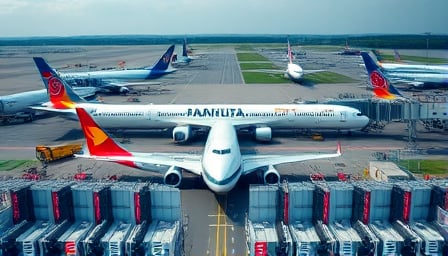International Consolidated Airlines Group SA: Navigating Turbulence in the Skies
In a world where the aviation industry is as unpredictable as the weather, International Consolidated Airlines Group SA (IAG) finds itself at a crossroads. With a market capitalization of £20.98 billion and a recent close price of £373.4, the company’s financial health is under the microscope. As the leading air transportation service provider, IAG’s operations span both international and domestic passenger and cargo services, boasting a global reach that serves customers worldwide. However, recent developments suggest that the skies may not be as clear as they appear.
Share Buyback Programme: A Strategic Move or a Distraction?
On July 30, 2025, IAG disclosed information regarding transactions carried out under its share buyback programme. This move, often seen as a sign of confidence by a company in its own stock, raises questions about IAG’s strategic direction. Is this an attempt to bolster investor confidence amidst turbulent times, or is it a distraction from more pressing issues? With a price-to-earnings ratio of 7.847, IAG’s valuation suggests that the market has tempered its expectations. The share buyback could be a double-edged sword, potentially boosting the stock price in the short term but also signaling a lack of better investment opportunities within the company.
The Air Europa Conundrum: A Missed Opportunity?
The aviation industry is no stranger to mergers and acquisitions, with companies constantly seeking to expand their reach and consolidate their market position. However, IAG’s recent attempt to acquire a stake in the Spanish airline Air Europa has hit turbulence. After the initial deal with IAG fell through, Air France-KLM also withdrew its interest, leaving the future of Air Europa uncertain. This development is a missed opportunity for IAG to strengthen its position in the European market. It also raises questions about IAG’s strategic priorities and its ability to execute complex transactions in a highly competitive environment.
The Ticket Tax Dilemma: A Blow to the Industry
Adding to the challenges faced by IAG and the broader aviation industry is the German government’s decision to maintain the current level of ticket tax. Despite calls for a reduction to stimulate demand in the post-pandemic recovery phase, the government has cited budget constraints as the reason for its inaction. This decision is a blow to airlines, including IAG, which are already grappling with fluctuating fuel prices and changing consumer behaviors. The ticket tax issue underscores the broader regulatory and economic challenges facing the aviation industry, which could impact IAG’s profitability and growth prospects.
Looking Ahead: A Path Through the Turbulence
As IAG navigates these challenges, the company’s leadership must chart a course that ensures long-term sustainability and growth. The share buyback programme, while potentially beneficial in the short term, should not distract from the need for strategic investments in fleet modernization, digital transformation, and customer experience enhancement. The failed acquisition of Air Europa highlights the importance of agility and strategic focus in a rapidly changing industry. Finally, the ticket tax issue serves as a reminder of the need for constructive engagement with regulators and policymakers to advocate for policies that support the industry’s recovery and growth.
In conclusion, International Consolidated Airlines Group SA stands at a critical juncture. The decisions made in the coming months will determine whether IAG can soar to new heights or if it will be forced to navigate through continued turbulence. The aviation industry is known for its resilience, and IAG, with its global reach and strong brand, has the potential to emerge stronger from these challenges. However, this will require strategic clarity, operational excellence, and a commitment to innovation. The world is watching, and the time for decisive action is now.
